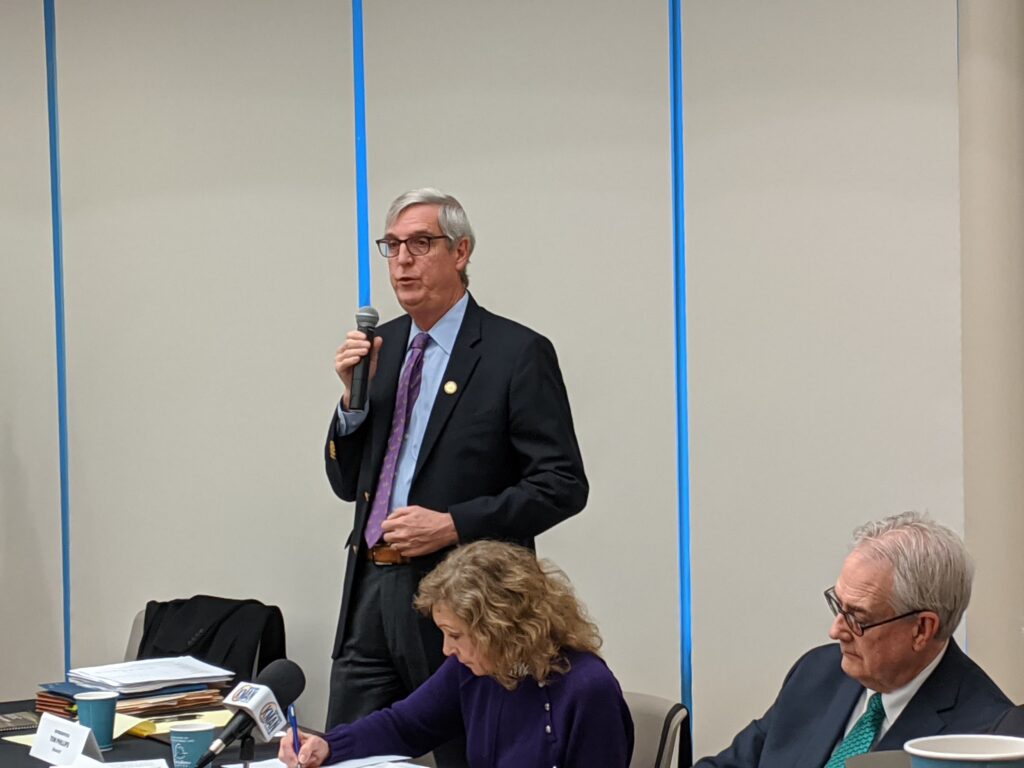After an anti-abortion constitutional amendment fell four votes short of passing, area legislators Saturday said the session faces a standstill.
Lawmakers such as Manhattan Sen. Tom Hawk (D), Rep. Sydney Carlin (D) and Rep. Tom Phillips (R) as well as Wamego Rep. Ron Highland (R) discussed hot topics and answered audience questions during their regular legislative coffee event, organized by the Manhattan Area chamber of Commerce and held at the Sunset Zoo Nature Exploration Place.
Following the amendment’s failure, Senate President Susan Wagle has said they will not take up Medicaid expansion until the amendment is passed and put on the ballot for public vote. The amendment, which passed in the state senate but failed to reach the necessary two-thirds majority needed to pass in the House. Had it passed, the bill would have altered the constitution so to eliminate protections for abortion.
Sen. Hawk says Wagle is obstructing democracy by holding back the Medicaid expansion vote in the senate when it has enough votes to pass and was endorsed by a bi-partisan group of senators.
“I think every bill should stand on its own, if it’s a good idea it should pass,” says Hawk, who said Wagle is trying to inflame voters while she seeks the Republican nomination to run for Pat Roberts’ open seat. “We shouldn’t hold other bills hostage.”
Rep. Phillips, a Medicaid expansion supporter, voted against the amendment. Pro-life himself, Phillips says he and the few GOP nay-sayers would be more supportive if the amendment would go for public approval in the General election over the Primary election ballot due to the difference in turnout.
“We know that historically 20, maybe 25 percent of the electorate turns out for a primary,” says Phillips. “On a general election it can be 60, perhaps 70 [percent]— depends who’s on the ballot.”
He says he’d vote for the bill in that setting, and desires to have as much of the electorate involved in a vote surrounding such a hot-button issue. Rep. Highland, though, supported the amendment, and says what happens next is up to GOP leadership to decide. He says they should know what the directive from above is by Feb. 25.
“We’ll see how that works out,” says Highland. “But as for the rest of us, we’re just doing our work as normal — visiting with constituents, working the bills that are in our committees.”
—————————————————————-
The quartet of lawmakers were not enthusiastic about a bill proposing a civics test requirement for high school graduation in Kansas. If the bill were to pass into law, students would need to pass an exam similar to the U.S. citizenship exam and would be afforded multiple attempts. The bill comes amid concern that students are leaving high school without a basic understanding of governmental functions.
Rep. Highland saw value in the proposal as well as potential hang-ups.
“Who develops it, how it’s structured — that’s the big question,” says Highland. “That’s one of the areas where the legislature has great ideas, but how to implement and who’s going to structure it may be a problem.”
Rep. Phillips, on the other hand, didn’t think the legislature needs to get involved, preferring such a choice be left to local school districts. He says that government and regulation isn’t the solution to every issue and that schools are already strapped trying to cover material currently in curricula.
“Yes, it needs to be addressed,” says Phillips. “But it’s our collective responsibility as members of this society to ensure that we educate our youth about civil responsibility [and]how our government is intended to function.”
Rep. Carlin agreed, recounting her recent experience discussing government and democracy with students at Bluemont and Woodrow Wilson Elementary.
“They are very interested in what we’re doing in government, they’re very aware of the problems we’re having,” says Carlin. “I found it very difficult to maintain a straight, non-partisan discussion with them because they really had strong opinions.”
—————————————————
Elected officials also discussed a battle that’s continued to brew between banks and credit unions in Kansas, and expressed their hopes that the groups can come to a consensus without legislative action.
Senate Bill 239 would assess on credit unions with $100 million in assets a 2.25 percent tax on net income and introduce a privilege fee surtax of 2.125 percent — similar to banks. The banks argue they are looking to level the playing field, while credit unions argue the change would tilt things in the favor of larger and financially stronger banking institutions.
Rep. Phillips says he sees no win-win deal if the legislature gets involved, with which Sen. Hawk agreed.
“I can guarantee my friends in the banking business and my friends in the credit unions that if the legislature decides it neither one of you will be happy.”
Rep. Highland and Carlin say they haven’t heard much from lobbyists on the topic yet, but multiple representatives urged lobbyists to come together and find a solution outside of the statehouse.
———————————————————–
Officials also discussed topics including state economic development efforts, a “fake meat” labeling bill, online sales tax collections and more. Hear the full discussion in two parts below:


